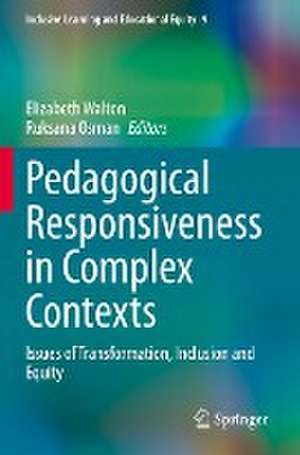Pedagogical Responsiveness in Complex Contexts: Issues of Transformation, Inclusion and Equity: Inclusive Learning and Educational Equity, cartea 9
Editat de Elizabeth Walton, Ruksana Osmanen Limba Engleză Paperback – 25 sep 2023
| Toate formatele și edițiile | Preț | Express |
|---|---|---|
| Paperback (1) | 636.94 lei 43-57 zile | |
| Springer International Publishing – 25 sep 2023 | 636.94 lei 43-57 zile | |
| Hardback (1) | 644.18 lei 22-36 zile | |
| Springer International Publishing – 24 sep 2022 | 644.18 lei 22-36 zile |
Preț: 636.94 lei
Preț vechi: 749.34 lei
-15% Nou
Puncte Express: 955
Preț estimativ în valută:
121.92€ • 132.47$ • 102.48£
121.92€ • 132.47$ • 102.48£
Carte tipărită la comandă
Livrare economică 21 aprilie-05 mai
Preluare comenzi: 021 569.72.76
Specificații
ISBN-13: 9783031127205
ISBN-10: 303112720X
Ilustrații: XXI, 202 p. 1 illus.
Dimensiuni: 155 x 235 mm
Greutate: 0.32 kg
Ediția:1st ed. 2022
Editura: Springer International Publishing
Colecția Springer
Seria Inclusive Learning and Educational Equity
Locul publicării:Cham, Switzerland
ISBN-10: 303112720X
Ilustrații: XXI, 202 p. 1 illus.
Dimensiuni: 155 x 235 mm
Greutate: 0.32 kg
Ediția:1st ed. 2022
Editura: Springer International Publishing
Colecția Springer
Seria Inclusive Learning and Educational Equity
Locul publicării:Cham, Switzerland
Cuprins
Foreword.- 1. Pedagogical Responsiveness in Complex Contexts.- 2. Pedagogical Responsiveness and Claims of Democratic Citizenship Education in Africa.- 3. State-less, Identity-less and Miseducated: The Experience of Students in Higher Education in South Africa. 4. Learning with Low Tech: Challenges of Moving to Remote Learning in a Time of Disruption.- 5. Pedagogical Responsiveness to Every Student in Singapore – Can Artificial Intelligence for Education be a Solution to Embrace the Complexity in Teaching and Learning? 6. Considering Knotworking as a Theoretical Tool to Enable Pedagogical Responsiveness in Complex Systems.- 7. Teacher Choices in Action: An Emergent Pedagogical Response and Intervention.- 8. Teaching and Learning to Support Pedagogical Responsiveness to Complex Educational Contexts: A Case of Pre-Service Teachers.- 9. Teaching to Inform, Form and Transform: Pedagogical Responses of An(other) Way of Knowing – The Almajiranci System of Northern Nigeria.- 10. A Comparative Account of Decolonising Political Theory in the Global South and North: The Case of Wits and SOAS.- 11. Conclusion: Pedagogical Responsiveness for Global Futures.- Index.
Recenzii
Notă biografică
Elizabeth Walton is Professor of Education in the School of Education at the University of Nottingham. Her research and teaching is in the field of inclusive education, with research interests that include: Teacher education for inclusive teaching; The field of inclusive education - its history, knowledge, and knowers; and Exposing exclusion and enabling inclusion in education. She is a visiting Associate Professor at the Wits School of Education in Johannesburg South Africa and serves as co-convenor of the UNESCO Research Chair in Teacher Education for Diversity and Development. Prior to her academic career, Elizabeth spent 20 years in secondary school teaching and school leadership.
Ruksana Osman is Professor and Senior Deputy Vice-Chancellor at the University of the Witwatersrand, Johannesburg, South Africa. Before then, she was the Dean of the Faculty of Humanities at the University of the Witwatersrand, Johannesburg, South Africa. She is also the former Head of the School of Education at the University of the Witwatersrand. She is an elected member of the Academy of Science, South Africa. Her expertise is in Higher Education, Research Led Teacher Education and Teaching and Learning in Higher Education. Her focus is on equity, access and success in teacher and higher education. She has authored six books. She also serves as convenor of the UNESCO Research Chair in Teacher Education for Diversity and Development.
Textul de pe ultima copertă
This book reflects a range of pedagogical responses to increasingly complex educational contexts. It finds this complexity in the interplay of a number of factors, including the diverse histories and identities of educational actors; institutional and systemic demands and constraints; competing conceptions of valued knowledge; and technological change. The chapters show the demand for pedagogical response to unexpected and unprecedented events (like COVID-19) and the importance of addressing barriers to access that become sedimented into institutional cultures. The authors, mostly from Global South contexts, are concerned with enabling educational access and inclusion in the face of competing global and local demands. They present new knowledge about pedagogical approaches that are relevant and effective in uncertain times and challenging places. Together, the contributors offer accounts of hope-full and innovative practice and conceptually rigorous engagement with fundamental issues of learning and teaching.
Caracteristici
Aligns with the concerns of Sustainable Development Goal 4 Evaluates the pedagogical responsiveness of a South African university to the COVID-19 pandemic Discusses the strength and weakness of Artificial Intelligence in education








